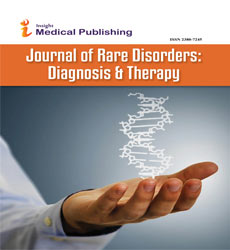Isotretinoin, Trimethylaminuria and the Internet
Mercedes Serrano, M Antonia Vilaseca and Jaume Perez-Payarols
1Neurometabolic Unit and Guía Metabólica Team, Hospital Sant Joan de Déu, Barcelona, Spain. U-703 Centre for Biomedical Research on Rare Diseases (CIBERER), Instituto de Salud Carlos III, Barcelona, Spain
2Research and Innovation Department, Hospital Sant Joan de Déu, Barcelona, Spain
- *Corresponding Author:
- Mercedes Serrano
Neurometabolic Unit and Guía Metabólica, Hospital Sant Joan de Déu
and U-703 Centre for Biomedical Research on Rare Diseases (CIBER-ER)
Instituto de Salud Carlos III, Barcelona, Spain
Tel: 34 93 253 2100
E-mail: mserrano@hsjdbcn.org
Received date: December 11, 2015 Accepted date: January 02, 2016 Published date: January 08, 2016
Citation: Serrano M. Isotretinoin, Trimethylaminuria and the Internet. J Rare Dis Diagn Ther. 2016, 2:1. doi:10.21767/2380-7245.100031
Copyright: © 2016 Serrano M. This is an open-access article distributed under the terms of the Creative Commons Attribution License, which permits unrestricted use, distribution, and reproduction in any medium, provided the original author and source are credited.
Letter to Editor
Dear Editor,
Trimethylaminuria (TMAU), also called fish odor syndrome, is an inborn error of metabolism due to decreased activity of flavincontaining monooxygenase 3 (FMO3) [1]. The characteristic fish odor results from excessive excretion of trimethylamine in urine, breath, sweat, and reproductive fluids. Although no physical symptoms are described, affected individuals suffer an unpleasant odor, resulting in serious social and psychological problems [1,2].
Although trimethylaminuria can be a congenital condition, acquired trimethylaminuria is described resulting from liver injuries, mainly related to viral hepatitis. The infection may permanently affect the expression of FMO3 [1]. Scientific knowledge about acquired TMAU is scarce; it is, however, an irreversible condition with serious consequences.
www.guiametabolica.org - a reference website for patients affected by inborn errors of metabolism [3], offers a community of those affected by TMAU, and it is one of the most visited. Interesting clinical data are shared at the site by the patients in an open manner.
We want to raise awareness about the experiences of three users of Guía Metabólica suffering fish odor syndrome who underwent treatment with isotretinoin.
Oral isotretinoin, a systemic retinoid, is often prescribed for the treatment of resistant acne [4]. Its secondary effects are well known, particularly those related to bowel disease and the potentially teratogenic properties in pregnant women. Moreover, patients under treatment should undergo periodical transaminase analysis. In fact, transaminase increases are described in 15-20% of patients, pinpointing the potentially hepatotoxic effects of isotretinoin. However, as far as we know, in the metabolism of isotretinoin there is no participation by FMO3.
www.guiametabolica.org users suffering fish odor were treated with retinoic acid for 1 to 4 years with no other relevant side effects. None of them underwent urinalysis to measure trimethylamine, and none of their attending dermatologists suspected an acquired trimethylaminuria. Moreover, doing a search through other open support groups on the Internet we found at least two other adults reporting sustained fish odor after isotretinoin treatment.
Acquired trimethylaminuria is not among the described side effects for isotretinoin. An interindividual difference among treated patients indicates that only some of them are predisposed to developing fish odor as a permanent consequence. Functional FMO3 polymorphisms may have a role in transient or intermittent forms [5]. They may also explain this individual susceptibility.
The possibility of an acquired trimethylaminuria should be borne in mind by dermatologists as this possibility may change the life of their patients forever.
Our observation highlights the relevance of social networks and online support groups that serve to provide access to personal experiences that may not be voiced in the medical interview. These new hypothesis need to be scientifically examined because of their clinical relevance.
References
- Mitchell SC, Smith RL (2001) Trimethylaminuria: the fish malodor syndrome. Drug MetabDispos 29:517-21.
- Ayesh R, Mitchell SC, Zhang A, Smith RL (1993) The fish odour syndrome: biochemical, familial, and clinical aspects. BMJ 307:655-7.
- Armayones M, Vilaseca MA, Cutillas, Fàbrega JJ, Fernández JJ (2012) Guiametabolica.org: empowerment through internet tools in inherited metabolic diseases. Orphanet J Rare Dis 7:53.
- Zouboulis CC, Bettoli V. (2015) Management of severe acne. Br J Dermatol 172:27-36.
- Shimizu M, Allerston CK, Shephard EA, Yamazaki H, Phillips IR (2014) Relationships between flavin-containing mono-oxygenase 3 (FMO3) genotype and trimethylaminuria phenotype in a Japanese population. Br J ClinPharmacol 77:839-51.
Open Access Journals
- Aquaculture & Veterinary Science
- Chemistry & Chemical Sciences
- Clinical Sciences
- Engineering
- General Science
- Genetics & Molecular Biology
- Health Care & Nursing
- Immunology & Microbiology
- Materials Science
- Mathematics & Physics
- Medical Sciences
- Neurology & Psychiatry
- Oncology & Cancer Science
- Pharmaceutical Sciences
